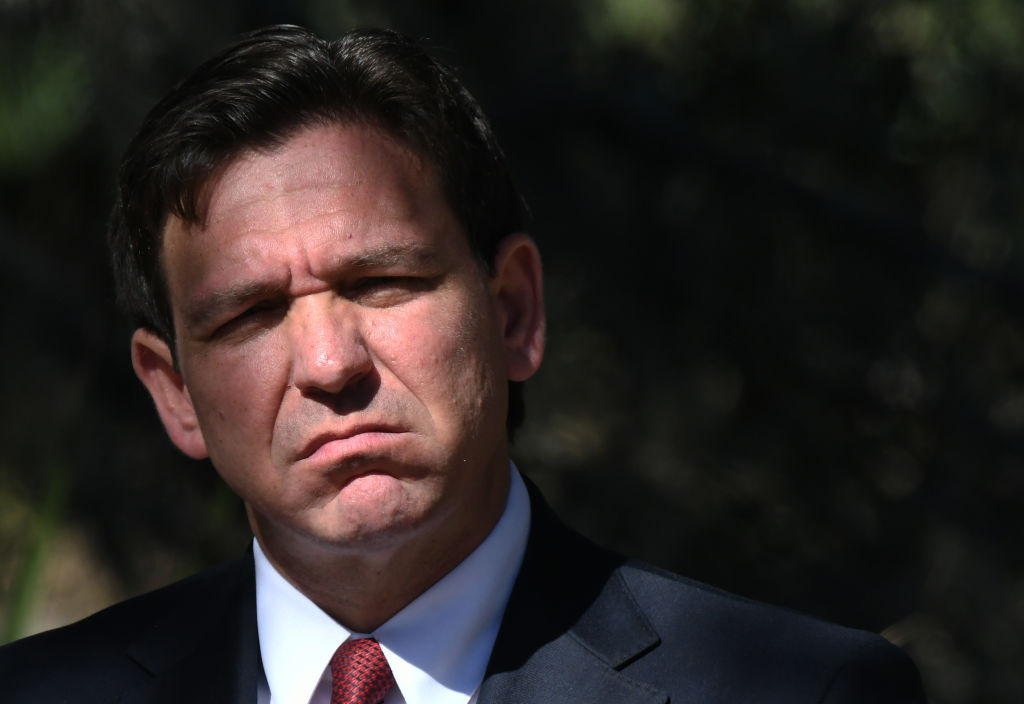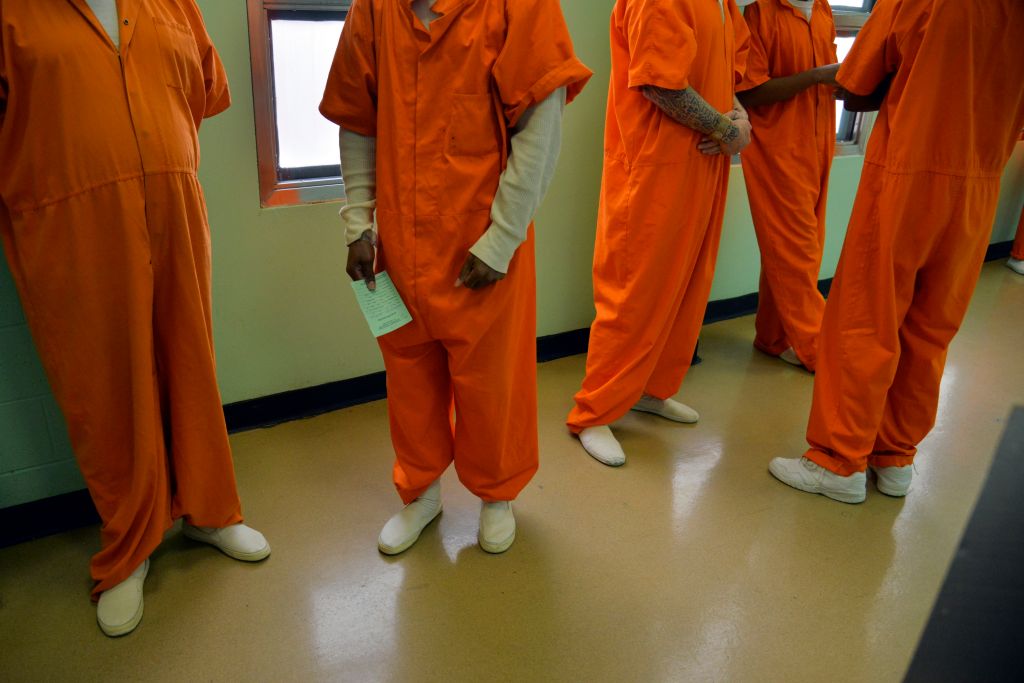Gov. Ron DeSantis Signs Bill Protecting Florida Police Officers From Civilian Oversight Committees

Source: SOPA Images / Getty
Here’s a question: Why is it that Florida Gov. Ron DeSantis always seems so dedicated to further protecting the most protected classes in America?
He protects white students and parents from any Black history or studies that might hurt their feelings. He protects the heterosexual and cisgender from LGBTQ studies, and, for whatever reason, Disney World. He protected the state of Florida from Black voting power, and he wanted to protect motorists from the Black Lives Matter protesters they might hit in the streets. Hell, it’s even arguable that DeSantis and the Florida Board of Education protected the legacy of slave owners by greenlighting a curriculum that teaches that enslaved people benefited from slavery and advocating for curricula that teach “opposing viewpoints” on slavery that don’t promote an “oppressor vs. oppressed” narrative.
Anyway, DeSantis has now signed a bill into law that protects Florida police officers from civilian oversight.
According to the Miami Herald, last week, DeSantis signed HB 601, which limits civilian investigations by government-affiliated boards into the behavior of local law enforcement officers, including in Miami, St. Petersburg and Tampa. The bill states that it “prevents anti-police activists from carrying out extrajudicial investigations against law enforcement,” which obviously opens the door for anyone who challenges police behavior to be labeled an “anti-police activist.”
From the Herald:
The law, which takes effect in July, has consequences for civilian oversight panels that in more than 20 Florida counties and cities look into citizen complaints against officers by using public records and witness interviews and by auditing police investigations. Some boards, which make recommendations about discipline, were created by voters, others by government officials following policing controversies. Under the bill, HB 601, these organizations will now largely be prohibited from receiving and following up on complaints.
OK, but why though?
If civilians are required by law to submit to police commands under threat of arrest, force and/or lethal force, why shouldn’t civilians, at the very least, have the agency to access public records and urge our local governments to hold cops accused of misconduct accountable?
Even St. Petersburg Mayor Ken Welch recently referred to the legislation as just another example of Florida’s “blanket solutions to problems that don’t exist.”
Kara Gross, the legislative director and senior policy counsel for ACLU Florida, said in a statement that the new law “seeks to undermine the work local communities across Florida have put into attempting to increase trust between residents and law enforcement.”
But that’s not how DeSantis sees it. The good governor of anti-“woke” propaganda described police review boards as a “political weapon” against police officers.
“They’ll set up these things called citizen review boards, usually in these very-tilted-politically jurisdictions,” DeSantis said during the bill signing in St. Augustine at the St. Johns County Sheriff’s Office. “They’ll stack it with activists, and they’ll just start reviewing things and trying to put people under the gun even if there’s no basis to do that.”
As usual, DeSantis didn’t bother citing any examples or evidence of “activists” abusing the right to pay attention to what cops are doing in their communities (let alone explaining whatever the hell a “titled-politically-jurisdiction” is), he just went with his usual citation: Trust me, bro, I’m right and you’re woke!
Of course, Florida Department of Law Enforcement Commissioner Mark Glass co-signed DeSantis’ dismissiveness of the importance of civilians having a say in how they’re policed, and claimed all criticism that the new legislation would “impede the community with law enforcement” is wrong.
“If they would pay attention to how our state works, we have review boards. We have the criminal justice standards and training commission that deals with every incident that’s referred,” Glass said. “Every agency has an internal affairs, and if they don’t they utilize another agency’s internal affairs, to investigate an incident. These men and women do not need to be scrutinized again and again by a committee that has no idea what they’re talking about.”
So, basically, a cop is saying only cops should be involved in investigating cops because cops holding cops accountable is what cops do. (If you listen closely, you can hear the faint sounds of millions of Black victims of racial profiling and police brutality rolling their eyes with the ocular strength of our ancestors.)
Mind you, the Herald noted that, in Tampa, “the Citizens Review Board formed in 2015 after a Tampa Bay Times investigation revealed that Tampa police were disproportionately ticketing Black bicyclists.” So, let’s say Black citizens in a Florida community know from their own experiences and can indicate through statistics that they are being policed disproportionately and treated more aggressively by police officers. Will this new legislation serve as roadblocks disallowing the people to form committees that can effectively scrutinize the police?
Actually, the bill does allow for an oversight committee comprised of civilians, as long as an officer hand-picks said civilians, one of which must be an ex-cop.
More from the Herald:
The bill also empowers county sheriffs to establish their own civilian oversight boards “to review the policies and procedures of his or her office and its subdivisions.” That board “must be composed of at least three and up to seven members appointed by the sheriff, one of which shall be a retired law enforcement officer.”
It’s worth noting that DeSantis believes (conservative) parents should be able to scrutinize to death what educators teach and constantly challenge (and in many cases, ban) any textbook or reading material they don’t want their (mostly white) kids being exposed to, but civilians who are directly affected by police misconduct can’t organize efforts to hold cops accountable.
Also worth mentioning is the fact that DeSantis also signed into law SB 184, which “prohibits the harassment of a police officer or first responder who is actively doing his or her job,” and “pertains to any person who has received a verbal warning not to approach an officer,” which might lead one to wonder if the law could restrict civilians from recording officers while they’re dealing with suspects and other civilians.
Because if the law says civilians can’t record an officer while they’re in the line of duty, and they also can’t challenge police departments on what their officers do while they’re in the line of duty, then what power at all does a citizen have to protect themselves from police misconduct?
So, maybe that’s the point!
SEE ALSO:
Explaining The Dangers Of Gov. DeSantis’ Bill to Ban College Diversity Programs
The post Gov. Ron DeSantis Signs Bill Protecting Florida Police Officers From Civilian Oversight Committees appeared first on NewsOne.





